🫖 Authentic Chai: A Rich and Flavorful Journey 🫖
Ah, Chai – a warm, aromatic, and comforting beverage that has won the hearts of people all over the world. ☕ Let’s dive into the wonderful world of Chai, exploring its history, components, preparation, and the time it takes to brew this delightful elixir. 🍵
What is Chai?
Chai, also known as Masala Chai, is a traditional Indian tea that combines black tea with a blend of aromatic spices and herbs. It’s a delightful fusion of flavors that offers a perfect balance of sweet, spicy, and creamy notes.
History of Chai:
Chai has a rich history dating back to ancient India, where it was believed to have been created for its therapeutic properties. The word “Chai” itself is derived from the Chinese word “chá,” which means tea. It was popularized in India by British colonialism, and over time, it became an integral part of Indian culture and cuisine.
Components of Chai:
The key components of Chai are:
-
Tea Leaves: Chai traditionally uses strong black tea leaves, like Assam or Darjeeling.
-
Spices: Spices are the heart of Chai. Common ones include cinnamon, cardamom, ginger, cloves, and black pepper. These add warmth and complexity to the brew.
-
Sweetener: Sugar or honey is used to sweeten the Chai. You can adjust the sweetness to your taste.
-
Milk: Milk adds a creamy richness to Chai. You can use dairy or non-dairy alternatives like almond, soy, or oat milk.
Steps to Prepare Authentic Chai:
-
Gather Your Ingredients: You’ll need tea leaves, spices, sugar, and milk.
-
Boil Water: In a saucepan, bring water to a boil.
-
Add Tea and Spices: Once the water is boiling, add tea leaves and spices. The proportion of spices depends on your preference, but a common mix is 1-2 cloves, 1-2 cardamom pods, a small piece of cinnamon, and a pinch of black pepper.
-
Simmer: Let the tea and spices simmer in the water for 5-7 minutes, or until it reaches your desired strength.
-
Add Sugar: Add sugar to taste during the simmering process.
-
Add Milk: After the tea has simmered, add milk to the desired level of creaminess. It’s typically a 1:1 ratio with water.
-
Strain and Serve: Strain the Chai into cups or mugs, and it’s ready to enjoy!
Time Required:
The time needed to prepare Chai can vary, but on average, it takes about 10-15 minutes. This includes the time to boil water, simmer the tea and spices, and add milk. Of course, the time can be adjusted based on your taste preferences and the desired strength of your Chai.
So there you have it, a fragrant, spicy, and delightful journey through the world of authentic Chai. It’s a beverage that not only warms your body but also your heart, making it a beloved staple in many cultures. Enjoy your Chai adventure! ☕🫖🌿
Certainly! Here are the nutrition facts and some health information related to a typical cup of Chai:
Nutrition Facts for a Cup of Chai (8 oz or 240 ml):
- Calories: Approximately 50-60 calories
- Total Fat: 1-2 grams
- Carbohydrates: 10-15 grams
- Sugars: 5-10 grams (may vary depending on the amount of added sugar)
- Protein: 1-2 grams
- Caffeine: Approximately 30-50 mg (depending on the type of tea used)
Health Information:
-
Antioxidants: Chai is rich in antioxidants, primarily from the black tea leaves and spices. Antioxidants help protect the body from oxidative stress and free radicals.
-
Digestive Benefits: Spices in Chai, like ginger and cardamom, are known for their digestive properties. They can help soothe stomach discomfort and aid in digestion.
-
Anti-Inflammatory Properties: Many of the spices in Chai, such as ginger and cinnamon, have anti-inflammatory properties, which can be beneficial for reducing inflammation in the body.
-
Heart Health: Some studies suggest that the consumption of black tea, a primary ingredient in Chai, may help improve heart health by reducing bad cholesterol levels.
-
Mood and Relaxation: Chai’s warm and comforting nature can have a calming effect, helping to reduce stress and promote relaxation.
-
Weight Management: Chai is relatively low in calories, especially if you go easy on the added sugar and use low-fat milk. It can be a good option for those looking to manage their weight.
-
Caffeine Content: Chai contains caffeine from the black tea leaves. While it provides a gentle energy boost, it’s lower in caffeine compared to coffee.
It’s important to note that the specific nutrition facts and health benefits can vary based on the recipe, including the amount of sugar and milk used, as well as individual variations in preparation. Adjusting the ingredients can also impact the calorie and nutrient content. As with any food or drink, moderation and balance are key to enjoying Chai as a part of a healthy diet.



